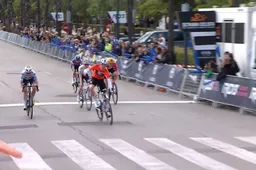UCI takes action on safety: First tested in women’s race, then rolled out at Rwanda World Championships
CyclingThursday, 07 August 2025 at 16:30

The riders at the World Championships in Rwanda will be equipped with GPS trackers, according to a statement released by the UCI on Thursday. An initial test will take place during the Tour de Romandie for women, with the cycling union explaining the reasoning behind the decision. “It is a step forward in ensuring the safety of cyclists,” it said.
ADVERTISEMENT
The debate about safety in cycling has been going on for decades, but recent cycling accidents continue to fuel the discussion. Murriel Furrer died last year at the World Championships in Switzerland, while André Drege died two months earlier in the Tour of Austria.
Furrer's death in particular sparked the debate about GPS tracking. The 18-year-old Swiss cyclist reportedly lay next to the road for a long time after her fall, and the emergency services only found her after about an hour and a half (!). A bizarre situation, and one that really highlighted the need for change.
ADVERTISEMENT
That change now seems to be coming, as the UCI has confirmed that the riders in the women's race of the Tour de Romandie will be tracked. “The Union Cycliste Internationale (UCI), in collaboration with the Tour de Romandie Féminin and participating teams, will conduct a test of a GPS safety tracking system during this year’s edition of the UCI Women’s WorldTour stage race (15-17 August),” according to the statement.
Read more below the photo!

Muriel Furrer tragically lost her life last year
ADVERTISEMENT
GPS trackers will also be used at World Cup in Rwanda
“This initiative, part of the UCI’s and SafeR’s ongoing efforts to enhance rider safety in professional road cycling, will see one rider per team carry a GPS tracking device,” the cycling union continued. “The same technology will be deployed at the 2025 UCI Road World Championships in Kigali, Rwanda, where all riders will carry the device.”
The aim of the test? “The objective of this test is to refine the UCI’s safety tracking software and establish protocols to provide real-time data to race control, medical teams and UCI Commissaires. This system will strengthen the monitoring of rider safety during races and enable rapid response in case of incidents.”
The UCI, therefore, considers this an important step. “This represents an important step forward in ensuring the safety of riders, and the UCI will continue to work closely with event organisers and all stakeholders on the broader implementation of such technology in the coming seasons.”
Read also
ADVERTISEMENT
IDL-productions

Vacancy: Growth Editor IDL Procycling - (native) English

Preview Clasica Jaén 2026 | Pidcock and company set for Spanish gravel and mud

New coach ‘200% convinced’ that ‘V8 engine’ Van Baarle can go toe-to-toe with Van der Poel and Pogacar

Wilco Kelderman backs Visma culture and Vingegaard’s choices: “I can switch off — he can’t”

The future Grand Tour man? Jarno Widar would rather take on Pogacar and the rest somewhere else
Latest Cycling News

Vacancy: Growth Editor IDL Procycling - (native) English

UAE manager warns rivals about an even better Tadej Pogačar, and Strava numbers seem to back it up

“I’ve honestly never had a lead-out like that,” Girmay beams after another sprint win

Unibet Rose Rockets see Groenewegen miss out again in elite sprint against Girmay

Vollering puts the cherry on top with dominant Valencia finale after superb sprint
Popular Cycling News

Tom Pidcock resigned: “UAE rode the perfect race”

Vingegaard in a Classic, Van Aert as sports director? Visma | Lease a Bike deliver a brilliant new video

UAE manager warns rivals about an even better Tadej Pogačar, and Strava numbers seem to back it up

Even on a coffee ride, Tadej Pogačar is putting out outrageous power numbers

Wilco Kelderman backs Visma culture and Vingegaard’s choices: “I can switch off — he can’t”
Latest Comments
- They were close to cracking a very tired Tadej that wasn't fully focused on the TdF with a team of riders focused solely on cracking Tadej. And if they cracked him, he would have still won. Tadej won't be racing the giro this year. It'll be an even easier win for him.Veganpotter09-02-2026
- Nice!Bea22-01-2026
- Those events are mental rest for him. Fun, without expectations. *Sagan lost his abilities because he gained weight and got lazy. Pogi will likely retire before that has a chance at happening.Veganpotter14-12-2025
- Ah, the consequences of riding for Israel.Veganpotter11-12-2025
- Pidcock could follow everyone but Pogi while finishing 3rd. No second place rider this season😃Veganpotter16-11-2025
- Now the Palestinian protestors can stop their whining. Trump came to the rescue. So they can now STFU and go back to waving the rainbow flags.raufus15-10-2025
- Cracked the code lol. If it was that easy to 'crack the code' jonny Vegas would be charging up the Kwaremont giving Pog a dose of his medicine. Evenepoel can't match pog on a climb and neither can mvdp. Anything with a half difficult climb and Pog smashes the field. Even on flat(ish)parcours like Roubaix it came down to a mistake and crash by pog to definitively crown mvdp. MSR is the only one that Pog probably won't win.kevpt10-10-2025
- We've seen this movie before. I think Pogacar is doping.DeadBlow10-10-2025
- 👍Bea08-10-2025
- 👌🏻Bea08-10-2025
Loading


